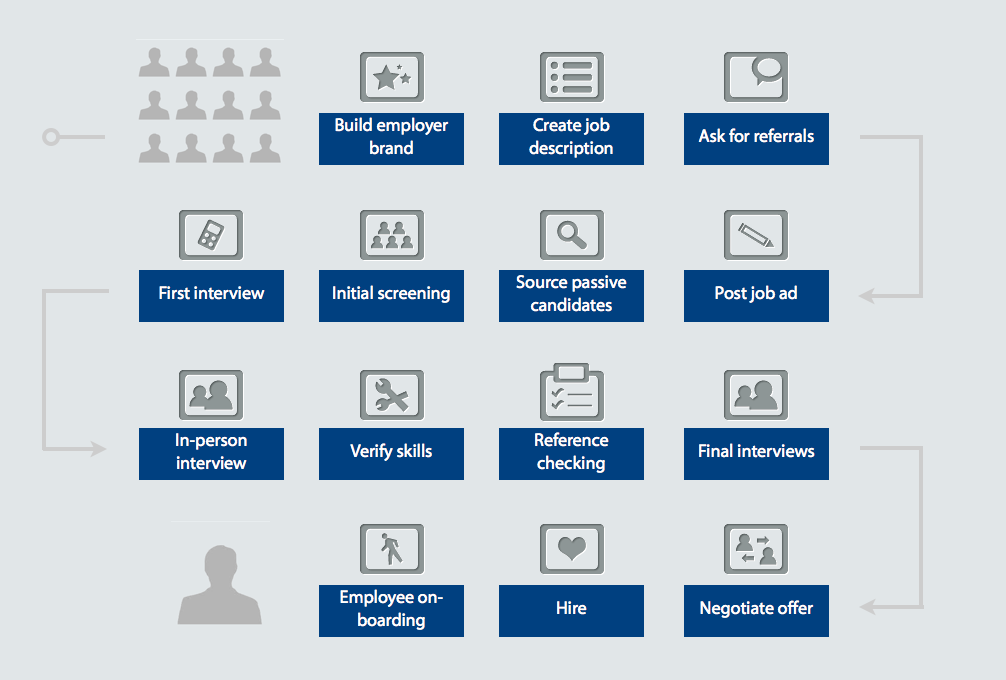This post is for the interviewer.

Currently, companies are getting crazy with the interviews and it is bad for everybody. And the worse, they are picking bad candidates.
Several companies do the process of hiring a marathon, and it is bad slow, expensive, a burden for every party, and finally picks the wrong candidates.
I've seen that big companies pick mediocre workers (and it is practically the standard) while small companies usually pick better collaborators. Why? Bad process of interviews.

What does a big company do? A highlander competition. And it is magnet for cheaters, liars and seasoned candidates.

What does a small company do?
Weeing the bad CV, they do a few interviews which finally end with a handshake and the next question: "Can you start tomorrow?".
PS: Collaborators are usually more compromised in small companies, and they are willing to work extra for no payment or do jobs over their responsibilities.

The not right list:
Getting late. C'mon, you aren't a doctor.
Memory game. Just don't. Google works and everybody has access to it.
A written test. Again, no. You are not hiring a school student, you are hiring an adult.
Complain if the interviewer arrives early. You are missing exactly the candidate you really want to hire: somebody who wants the job.
Staging and multiple interviews. First with the psychologist, then with the technical, then with some middle boss, and later with Bob the Janitor. Just no!.
Rejecting a candidate because he or she got nervous. Again no. You really want to hire somebody who wants the job.
Don't do technical questions because you are one of many interviewers and you are not the technical interviewer. Again no. If you are not the technical interviewer then you must learn the topic (at least the basics), or at least ask the technical group questions. You must do technical questions because you are hiring somebody to do A DAMN JOB.
Don't do personal questions because of boundaries, etc. You must ask personal questions. If the question is not legally permitted to be asked, then you can say to the candidate he is not obliged to answer. Why? Because you are hiring a person.
Listen to sob stories. Spoiler: Everybody has a sob story.
Ghost a candidate: That is silly. For example, I picked a candidate but he turned out my proposal (he found a better job, nothing strange because he was good at it). So, I decided to pick the second on the list, and he was unavailable. Finally, I hired the third one.
Don't send reject emails because we don't do that. That is a bad practice. If you have been in this "rodeo" for so long, then you have seen the same faces over and over. If you ghost a candidate, then most likely, the candidate will hate and distrust you, and he/she will be less willing to go to another interview with you.
Colors tests.
Rorschach tests (yes, some interviewers still use it)
Draw a tree/etc.
Don't talk about money. If you are an interviewer, then you know the budget, so if the candidate fits in the job, then you must give him THE NUMBER, plus the other perks (a remote job is a nice perk). A bold interviewer starts with a fixed number.
Don't be cheap. If the company gives you a budget of $50-$150 (it is just an example), then you must never ever go to the lower price. You are not a slave master, you are an interviewer, and you want to hire the best in the budget, not the cheapest one (who is usually the worst one of the guys that will jump to a better job). So, if the budget is between $50-150, then go for $100-150, commonly $120, so you can lower if the candidate hasn't enough experience and raise it if is the best candidate.
Multi-round interview. <-- why?

The selling point
Your pool of candidates is your strength. You want to have the most candidates. It's horrible when you want to hire somebody that you are unable to find a candidate, and it happens, a lot of times, especially for specialist jobs.
Be fast and personal. For example, X company wants to hire a new HVAC technician. If you spend an hour per candidate, then you could interview at most 8 candidates per day. Time is ticking and most likely the company wants the candidate for yesterday. Instead, if you do a 15-minute interview, then you could interview more than 30 candidates per day. So, in a single day, you can make a decision and everybody will be happy: your company, you, and the candidate. And don't forget to contact the rejected candidates. Remember, they are your strength. Even the rejected ones could be useful in the future, including cheaters/liars.
How to do a good interview.
Be personal and humble. Offer him/her something to drink. That is not a position, that is a strategy.
Ask the regular questions, but remember, to be fast and short.
Ask technical questions. Are you clueless about the job? It is not a problem. Just ask who asks the job for a couple of questions or go for the Internet. For example, to hire an HVAC technician. What the hell is HVAC? Go to the internet and see it by yourself. Example the next image: So, an HVAC technician is required to use tools, work in the ceiling, use safety measures, and maybe a certification. You have a lot of questions.

Remember: you are the interviewer, so the candidate must explain their job. For example: the HVAC: "So, you use a gauge thing tool, what does it do?
Bad answer: I don't know... (or a short and generic answer).
Good answer: That is a pressure meter, it does... (the more technical the answer, then the better the candidate, why? If the candidate loves his job, then it is exactly who you want to hire, and he or she will talk alot about it). Later you can check its validity on the Internet.
Ask personal questions. Just keep it professional. Some questions can be considered as "illegal". but you must ask for it regardless of its legality. Just ask politely and voluntarily. YOU MUST ASK FOR IT.
You must look and his/her face.
Ask a cueball question: It is because you want to weed out cheaters. Example: "Do you know the brand of HVAC Texan-Star?". (that company does not exist, so any question other than "I don't know" or "there are many companies", is invalid.)
If you have +1000 candidates, then you WILL NOT INTERVIEW them all. Nobody does but when many interviewers claim they do. It is a lie. Nobody will read 1000 resumes. So, pick the first 100 and do your job.
Now, if you really want to interview +1000 candidates (for example to hire 200 workers for a new Mall), then use technology. Add a Google Forms (or Microsoft Forms), ask them to fill the form (make it simpler), and save the info on a sheet. Then, filter, filter, and pick your candidates.

